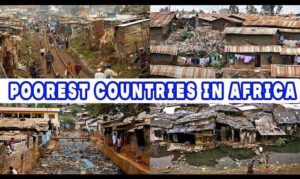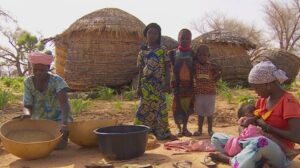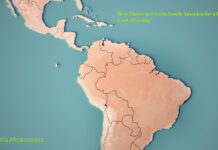Welcome to this post about the top 10 poorest countries in Africa, via Afrokonnect. In the global economic landscape, Africa is being faced with various challenges which has hampered her ability to ensure the development of her economy. The year though, hasn’t been favorable to various African countries especially the least economically advantaged.
This article focuses on the top 10 poorest countries in Africa and it also unravels certain factors and challenges which has led to the present condition of poverty in these nations. Some of the economic indicators used to access these nations includes GDP per capita, employment rates, access to basic amenities, Etc. Factors aiding the rise of poverty on the African continent include some of these factors:
1) Political Instability and Governmental Issues:
The constant leadership changes, coups and frequent political instability can lead to a disruption of long-term planning by the government. These factors alongside a lack of effective government is responsible for further accelerating the economic challenges faced by impoverished nations on the African continent.
2) Armed Conflicts:
The rampant state of armed conflicts in some of these African countries have led to massive political instability. Hence, leading to loss of infrastructure, lives, hindering economic development and creating long-term economic challenges.
3) Economic dependence on few sectors:
Most African countries especially the top 10 poorest countries in Africa are dependent on few sectors, most notably Oil, Agriculture, Mining, Etc. This narrow economic base makes such countries vulnerable to fluctuations in the prices of these commodities.
4) Healthcare and Education deficiency:
A lack of proper healthcare and education contributes massively to a cycle of poverty. This hinders the development of human capital and productivity of the workforce.
5) Debt Burden:
Huge amounts of debts owed by these countries can divert resources meant for various economic projects into the servicing of debts. This huge debt burden can hinder a country from having the ability to invest in long-term development hence impoverishing the country.
Top 10 Poorest Countries in Africa
1) Malawi – GDP Per Capita: $226
Malawi, often referred to as the “Warm Heart of Africa” is a landlocked country in southeastern Africa. This country is known for its numerous economic and political challenges hence elevating its status to the “poorest country on the continent”.
Some of the factors influencing Malawi’s position on this map includes: Agricultural dependency, population pressure, Health and Education Challenges, Infrastructural deficit, political instability, Debt burden, Etc. To overcome this present economic challenges, Malawi must focus on adopting a comprehensive approach to address immediate challenges. They must also prioritize having a long-term development goal.
2) Burundi – GDP Per Capita: $267
Burundi, which is located at the heat of East Africa has grappled with various economic challenges which has consolidated its position as one of the poorest countries on the African continent.
One of the key factors that led to Burundi’s widespread poverty was the ethnic tension between the Hutu and Tutsi communities. These tensions led to widespread violence which still hinders economic development and creating an enabling environment for sustainable growth. Burundi has since began taken steps towards economic reforms. However, it needs a comprehensive approach to properly address the root causes of the economic challenges it faces today.
3) Central Africa Republic (CAR) – GDP Per Capita: $333
It is located in Central Africa and possesses a total area size of over 620,000 square kilometers. The country is known for its abundance of natural resources. However, due to resource exploitation and corruption, it has been unable to channel this resource abundance to wealth for the general populace.
Weak governance have also hindered effective management of these resources for the populace. It has also been plagued by various internal conflicts, most notably the Central African Republic Bush War. The war was responsible for the massive eradication of growth of the country’s economy. It also caused a huge humanitarian crisis in the country because most people were left on the streets due to a lack of shelter.
4) The Gambia – GDP Per Capita: $371
It is a small Islamic country located in West Africa. The country is also the smallest of the West African region. The country focuses its economic strength on 3 sectors namely: Farming, Fishing and Tourism. This has led to its large impoverished population as its heavy dependence on agriculture makes its vulnerable to “Climate Change”. Hence, leading to a massive food insecurity among large numbers of the Gambia’s populace.
The tourism sector in the Gambia has also been on a massive decline. The global economic challenge accompanied with the COVID-19 Pandemic has severely impacted international travel. This has led to a sharp and massive decline in the tourism revenue for the country leading to wide-scale poverty among the populace.
5) Niger – GDP Per Capita: $415
The country is located in West Africa and its name was gotten from the popular River Niger which connects the country with Nigeria. The country is faced with various geographical issues which has hindered its ability to explore massively the agricultural sector.
The country is majorly arid with large expanses of desert, including certain parts of the Saharan desert. This poses a major challenge for agriculture and water resources leading to a massive food insecurity.
6) Liberia – GDP Per Capita: $454
The country is located on the coast of West Africa and possesses a total of 111, 369 square kilometers. Liberia’s position in this ranking can be attribute to two civil wars in the late 20th century which had devastating effects on the Liberian economy. The wars which spanned from 1989 – 1996 & 1999 – 2003 left the country in ruins. It also caused widespread destruction of agriculture, population displacement, loss of human capital as over 500,000 deaths were recorded, Etc. Note: According to various reports, Liberia was considered a developed country before the civil wars.
7) Madagascar – GDP Per Capita: $463
The republic of Madagascar is an island which is known as the 4th largest in the world. The country is one of unique biodiversity and a rich cultural heritage. The country is one which is over-dependent on Agriculture and the increasing trend of Climate Change in the world has had ripple effects on the revenue generated by the economy of Madagascar.
Climate-related events such as droughts, changing precipitation patterns and cyclones has disrupted agricultural activities. This has led to widespread food insecurity among the country’s populace. The massive political instability in the country has also hindered the government’s ability to effectively address various economic challenges plaguing the country.
8) Democratic Republic of Congo (DRC) – GDP Per Capita: $484
The Democratic Republic of Congo (DRC) is a vast and resource-rich country located in Central Africa. The country is one which has faced numerous challenges hence justifying its position amongst the poorest countries on the continent. The country is one which God has blessed with numerous resources such as copper, cobalt, and diamonds.
However, even though these resources have the potential to contribute massively to the countries growth their exploitation and the scramble for control of these resources have thrown the country into a never-ending cycle of violence.
This has greatly hindered the equal distribution of wealth. The country has also been afflicted with various wars which involves internal and external players. These conflicts have contributed massively to loss of life, displacement of citizens and a massive destruction of infrastructure. These has had major crippling effects of the economy of the country most notably deterring foreign investments and hindering essential economic activities.
9) Ethiopia – GDP Per Capita: $505
The country which is bordered by Somalia, Kenya and other prominent countries has been plagued with various economic challenges. The massive corruption in the country’s government has hindered the growth of the country and has thrown the country into a puddle of foreign debt.
This has hindered government’s ability to embark on various land-breaking projects and activities and majority of their budget has been dedicated to the servicing of these debts. Climate change has also had its effects of the country as the country is mostly agrarian but the trend of dry wind and harsh weather conditions has devastated the agriculture sector in the country. This has massively affected the country’s revenue negatively and the economic development of the country.
10) Guinea – GDP Per Capita: $558
The country is located on the western coast of Africa and endowed with abundant natural resources. Guinea’s core economic wealth comes mainly from its natural resources. The country is popular with the presence of bauxite, which is a fundamental component in the production of aluminum.
However, the presence of these resources which is expected to provide economic potential has been the source of their own downfall. The country’s over-reliance on the bauxite exports makes its very vulnerable to price fluctuations which has had rippling effects on the economy of the country.
The country is also suffering from significant infrastructural deficits which has hindered economic development and accounted for inadequate transportation networks, energy shortages, and limited the country’s access to modern technologies which is crucial to its industrial growth.
Conclusion on the top 10 poorest countries in Africa

The top 10 poorest countries in Africa reflects the various economic challenges which are shaping the future of these nations. The impacts of political instability and governmental issues can be waved aside as it has caused the impoverishing of various countries such as CAR, Liberia, Etc.
The vulnerabilities associated with focusing on a mono type of economy have also been impactful in the massive food security faced by these countries. The lessons drawn from this article is a call to nations to look into a broader global conversation on equitable development for all countries globally. This will aid in addressing the root causes of poverty hence driving development which can lead to a transformative future for these countries and the global populace at large. Thanks for reading and I hope to see you again on Afrokonnect.ng.
















